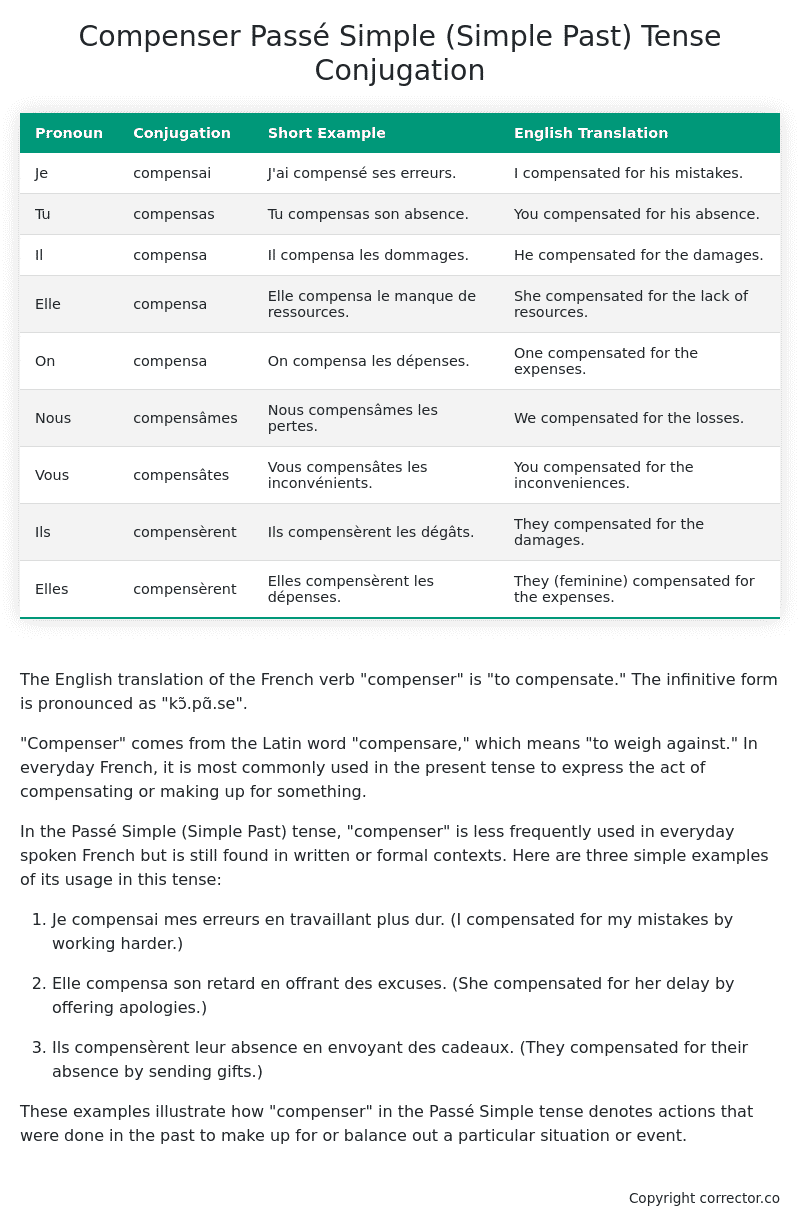Passé Simple (Simple Past) Tense Conjugation of the French Verb compenser
Introduction to the verb compenser
The English translation of the French verb “compenser” is “to compensate.” The infinitive form is pronounced as “kɔ̃.pɑ̃.se”.
“Compenser” comes from the Latin word “compensare,” which means “to weigh against.” In everyday French, it is most commonly used in the present tense to express the act of compensating or making up for something.
In the Passé Simple (Simple Past) tense, “compenser” is less frequently used in everyday spoken French but is still found in written or formal contexts. Here are three simple examples of its usage in this tense:
-
Je compensai mes erreurs en travaillant plus dur.
(I compensated for my mistakes by working harder.) -
Elle compensa son retard en offrant des excuses.
(She compensated for her delay by offering apologies.) -
Ils compensèrent leur absence en envoyant des cadeaux.
(They compensated for their absence by sending gifts.)
These examples illustrate how “compenser” in the Passé Simple tense denotes actions that were done in the past to make up for or balance out a particular situation or event.
Table of the Passé Simple (Simple Past) Tense Conjugation of compenser
| Pronoun | Conjugation | Short Example | English Translation |
|---|---|---|---|
| Je | compensai | J’ai compensé ses erreurs. | I compensated for his mistakes. |
| Tu | compensas | Tu compensas son absence. | You compensated for his absence. |
| Il | compensa | Il compensa les dommages. | He compensated for the damages. |
| Elle | compensa | Elle compensa le manque de ressources. | She compensated for the lack of resources. |
| On | compensa | On compensa les dépenses. | One compensated for the expenses. |
| Nous | compensâmes | Nous compensâmes les pertes. | We compensated for the losses. |
| Vous | compensâtes | Vous compensâtes les inconvénients. | You compensated for the inconveniences. |
| Ils | compensèrent | Ils compensèrent les dégâts. | They compensated for the damages. |
| Elles | compensèrent | Elles compensèrent les dépenses. | They (feminine) compensated for the expenses. |
Other Conjugations for Compenser.
Le Present (Present Tense) Conjugation of the French Verb compenser
Imparfait (Imperfect) Tense Conjugation of the French Verb compenser
Passé Simple (Simple Past) Tense Conjugation of the French Verb compenser (You’re reading it right now!)
Passé Composé (Present Perfect) Tense Conjugation of the French Verb compenser
Futur Simple (Simple Future) Tense Conjugation of the French Verb compenser
Futur Proche (Near Future) Tense Conjugation of the French Verb compenser
Plus-que-parfait (Pluperfect) Tense Conjugation of the French Verb compenser
Passé Antérieur (Past Anterior) Tense Conjugation of the French Verb compenser
Futur Antérieur (Future Anterior) Tense Conjugation of the French Verb compenser
Subjonctif Présent (Subjunctive Present) Tense Conjugation of the French Verb compenser
Subjonctif Passé (Subjunctive Past) Tense Conjugation of the French Verb compenser
Subjonctif Imparfait (Subjunctive Imperfect) Tense Conjugation of the French Verb compenser
Subjonctif Plus-que-parfait (Subjunctive Pluperfect) Tense Conjugation of the French Verb compenser
Conditionnel Présent (Conditional Present) Tense Conjugation of the French Verb compenser
Conditionnel Passé (Conditional Past) Tense Conjugation of the French Verb compenser
Conditionnel Passé II (Conditional Past II) Tense Conjugation of the French Verb compenser
L’impératif Présent (Imperative Present) Tense Conjugation of the French Verb compenser
L’impératif Passé (Imperative Past) Tense Conjugation of the French Verb compenser
L’infinitif Présent (Infinitive Present) Tense Conjugation of the French Verb compenser
L’infinitif Passé (Infinitive Past) Tense Conjugation of the French Verb compenser
Le Participe Présent (Present Participle) Tense Conjugation of the French Verb compenser
Le Participe Passé (Past Participle) Tense Conjugation of the French Verb compenser
Struggling with French verbs or the language in general? Why not use our free French Grammar Checker – no registration required!
Get a FREE Download Study Sheet of this Conjugation 🔥
Simply right click the image below, click “save image” and get your free reference for the compenser Passé Simple tense conjugation!

Compenser – About the French Passé Simple (Simple Past) Tense
Formation
Usage
Narration
Historical Context
Interactions with other tenses
Passé Composé
Imparfait
Conditional and Subjunctive
Summary
I hope you enjoyed this article on the verb compenser. Still in a learning mood? Check out another TOTALLY random French verb conjugation!


